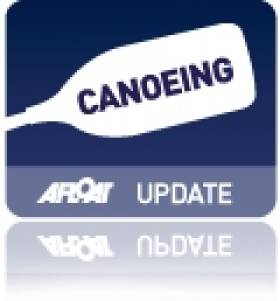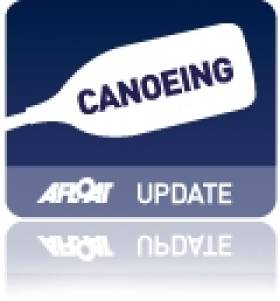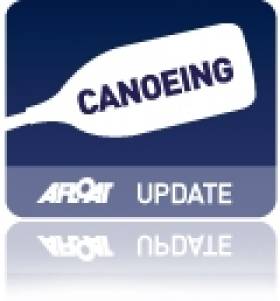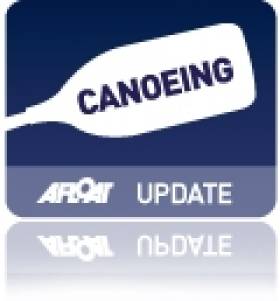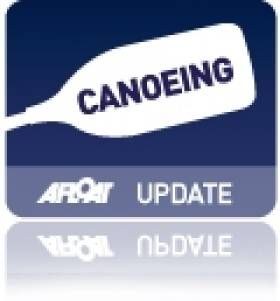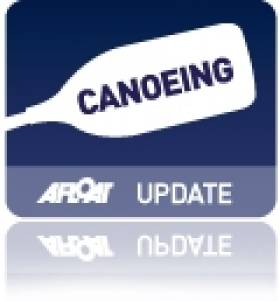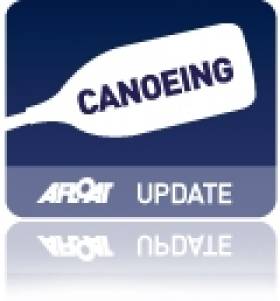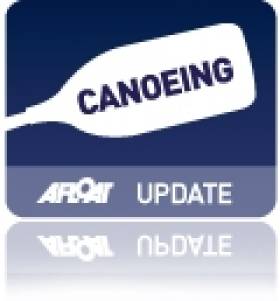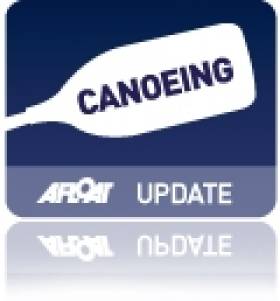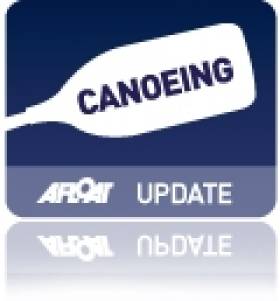Displaying items by tag: canoeing,
Experience Tells in Rough and Tumble of Liffey Descent
# CANOEING: Two K2 boats with a very marked combination of experience and youth led the way home at the Liffey Descent today. Deaglan O Drisceoil (47) and Tom Brennan (20) won in a fine time of one hour 47 minutes and 54 seconds, while the father-and-son combination of Malcolm Banks (50) and Liam Banks (20) followed them in. The K2 of Peter Egan and British international paddler Jon Simmons were third, although they suffered a capsize at Straffan weir, where there were a series of chaotic collisions.
Mickie Brennan of Thomastown Paddlers was an impressive winner in the K1 class, taking this title for the first time. Kevin Pierce of Wildwater Kayak Club was second, with Brennan’s clubmate Anthony Forristal third.
The good conditions made for a satisfactory day out at the new venue of Garda Boat Club. The prizes were presented by Kieran Mulvey and John Treacy of the Irish Sports Council.
Liffey Descent, Straffan to Islandbridge, Saturday (Selected Results)
K1 – Senior Men: 1 M Brennan (Thomastown Paddlers) 1:54.33, 2 K Pierce (Wildwater KC) 1:55.10, 3 A Forristal (Thomastown Paddlers) 1:59.11. Senior Women: A Smith (Wildwater KC) 2:18.35. Masters: 1 G Mawer (Salmon Leap) 1:55.09
K2 – Senior: 1 D O Drisceoil, T Brennan (Salmon Leap) 1:47.54, 2 M Banks, L Banks 1:48.10, 3 P Egan, J Simmons 1:48.49. Mixed: 1 J Egan, B Farrell (Salmon Leap) 1:56.07. Junior: 1 B O Casaide, R Brady (Salmon Leap) 2:11.40. Masters: A Seaford, J Treadgoud (Reading) 2:06.34. Veteran: 1 T Dillon, P Moroney (Wildwater KC) 2:04.04.
Touring Kayak Double: 1 P Scott, M Cooper 2:06.17, 2 S Martin, A Martin (Richmond) 2:06.49, 3 G Collins, B Gallagher (Salmon Leap) 2:12.07.
Wildwater – Senior Men: 1 A Hamel 2:04.16, 2 I Mac Giolla (Salmon Leap) 2:05.07, 3 J Gallagher (Galway KC) 2:13.57.
Canadian Triple: 1 S Doyle, M McGrath, D Doyle (Tullow) 2:53.31, 2 D Carroll, L Griffin, C Cullen 3:01.47, 3 C Slevin, N Slevin, M Slevin (32nd Limerick Scouts) 3:03.52.
Canadian Double: 1 B McNulty, D Bradburn (Chester) 2:39.36, 2 A Magrath, P Tennant (Paddleplus) 2:35.10, 3 N Canavan, T Marron (Mid Antrim) 2:38.47.
Canadian Single (ICF): 1 A Hales (Czech Canoe Team) 2:04.33, 2 D Jirka (Czech) 2:05.01, 3 M Novak (Czech) 2:05.40. Canadian Single: 1 C Smith 2:54.08, 2 K McCabe (Lisburn City) 3:16.47, 3 A Redmond 3:24.20.
General Purpose – Senior Men: 1 S Hendrick (Ribbontail Paddlers) 2:21.33, 2 D Horkan (Moy) 2:21.48, 3 M Redmond (Wildwater KC) 2:26.28. Senior Women: 1 H Clarke 2:32.56, 2 J Kilbride 2:39.39, 3 E Kelly (Castleknock College) 2:40.19. Junior: R Mac Ghiolla Rua (Celbridge) 2:28.59, 2 P Deering (ICU) 2:29.47, 3 G Doolan (Celbridge Paddlers) 2:36.41. Junior Women: C Nic Ghiolla Rua (Celbridge) 2:56.26. Masters: R Vincent (Saor Valley) 2:17.05, 2 J Keegan 2:23.33, 3 N Butler (DBSC) 2:25.30.
# CANOEING: Ireland took a creditable ninth place at the Olympic Games today when Andrzej Jezierski dominated the B Final of the C1 200 metres in the Canoe Sprint competition at Eton Dorney.
Jezierski, who had a poor start in his semi-final and missed out a place in the A Final, nailed it this time and led as he came into the closing stages. Vadim Menkov of Uzbekhistan came closest to catching the Cork-based competitor, but Jezierski won by .127 of a second.
Olympic Games – Canoe Sprint, Eton Dorney – C1 200m, B Final (places 9 to 16): 1 Ireland (A Jezierski) 44.041 seconds, 2 Uzbekhistan 44.168, 3 Hungary 44.466.
# CANOEING: A poor start cost Andrzej Jezierski dearly it the Olympic Canoe Sprint semi-finals this morning. A very tough draw in the C1 200 metres saw the Ireland competitor needing to finish in the first two of a top-class field to be sure of a final place, though the two fastest third-place losers of the three semis would also qualify. However, Jezierski struggled from the start and even his customary better second half could only secure fourth. It was the fastest of the three semi-finals. Jezierski is now set for the B Final.
The top two places in the semi-final were taken by Ivan Shtyl of Russia and Alfonso Benavidez Lopes de Ayala of Spain.
Olympic Games
Canoe Sprint – Eton Dorney – C1 200m – Semi-Final (First Two to Semi-Finals): 1 Russia (I Shtyl) 40.346, 2 Spain (A Benavidez Lopes de Ayala) 40.619; 4 Ireland (A Jezierski) 42.012.
# CANOEING: Ireland had a terrific start in the Olympic Canoe Sprint events at Eton Dorney this morning. Andrzej Jezierski was not happy with his start in the C1 200 metres but covered the second 100 metres very well to to finish second and qualify comfortably for the semi-finals.
Mathieu Goubel of France won the heat, but the big surprise was that Valentin Demyanenko, the reigning world champion, did not qualify. The man who represents Azerbaijan finished seventh and last.
Olympic Games
Canoe Sprint – Eton Dorney – C1 200m – Heat One (Six to Semi-Finals): 1 France (M Goubel) 41.248, 2 Ireland (A Jezierski) +0.156, 3 Japan (N Sakamoto) +0.280, 4 Canada (J McCoombs) 0.494, 5 Brazil (R Oliveira) +0.968, 6 Australia (S Marczak) +1.597; 7 Azerbaijan (V Demyanenko) +2.946.
# CANOEING: A very good second run in the heats, when she was under real pressure to perform, gave Ireland’s Hannah Craig a place in the semi-finals of the Olympic Games today. Eoin Rheinisch had qualified in the canoe slalom in the men's K1 on Sunday.
The course at Lee Valley proved extremely testing for the competitors in the women’s K1 canoe slalom. The top 15 of 21 qualified, and Craig clocked 117.07 seconds for her first run, which placed her 14th for the first run. This included eight seconds in penalties. The time put her into second place at this stage behind Luuka Jones of New Zealand who clocked 109.23. However, the top competitors then pushed through, with Maialen Chorraut of Spain setting an outstanding time of 98.75 seconds. But some of the top canoeists in the world, including Jessica Fox of Australia and Corinna Kuhnle of Austria did poorly on the first run and lay behind Craig, with every chance they would push Craig out with their second runs: the Irishwoman knew she had to improve to be sure of making that top 15.
Her second run looked better from the start. She moved sweetly all the way to the really difficult gate 12, on which she lost some time, but she found her way again and only a clip on gate 19, bringing her a two-second penalty, tainted a fine round of 108.99 seconds.
Fox and Kuhnle did indeed set excellent times in their second runs, ensuring that even the better second run only secured 14th place for Craig. Jones took the 15th spot.
Olympic Games – Canoe Slalom – Women’s K1 Heats (First 15 qualify for semi-final): 1 Spain (M Chorraut) 98.75 (1st run); 14 H Craig 108.99 (2nd run).
# CANOEING; Eoin Rheinisch qualified for the semi-finals of the Olympic Games with a fine first run in the K1 canoe slalom heats. Fifteen off the 22 competitors went through, and Rheinisch will go off 12th on Wednesday.
His first run of 89.97 placed him sixth – though team manager Karl Dunne had to launch an immediate objection to remove a penalty of two seconds given wrongly for a supposed touch on gate 19. Rheinisch could not improve on that in the second run – he had another penalty-free paddle, but clocked 90.72 seconds. His first run was enough to see him through in heats won by Hannes Aigner of Germany, who clocked a superb 83.49 seconds in his second run on a technically difficult course.
Benjamin Boukpeti, the man who went off last in the Olympics in Beijing and pushed Rheinisch out of bronze medal position, qualified in 14th, and Richard Hounslow of Britain had to produce a good run under pressure to qualify in 11th. Among those eliminated were Scott Parsons of the United States and Warwick Draper of Australia.
Olympic Games – Canoe Slalom: Men’s K1 Heats (Irish interest): 1 Germany (H Aigner; 2nd run) 83.49; 12 Ireland (E Rheinisch) 89.97.
# CANOEING: Andrzej Jezierski finished fifth in the A Final of the C1 200 class at the Canoe Sprint European Championships in Zagreb in Croatia today. The Poznan native, who lives in Co Cork, has reportedly been suffering from a shoulder niggle, but this placing continues an improving run since he qualified for London 2012 in May. He finished 14th in the World Cup in Poznan and seventh in the World Cup in Duisburg. “We are very pleased with today’s result,” said Karl Dunne of the Irish Canoe Union. “It’s good progress.”
Olympic Hopeful Jezierski Qualifies for A Final At European Canoe Sprint Championships
# CANOEING: Ireland’s hopes in Canoe Sprint at the Olympic Games received a boost today when Andrzej Jezierski qualified for the A Final at the Canoe Sprint European Championships in Zagreb. The Cork-based athlete, who will represent Ireland in the C1 200 class in London 2012, finished second in his semi-final today in that class, having placed third in his heat.
Canoe Sprint European Championships, Zagreb – Day Two (Irish interest)
Men
C1 200
Heat One (First to final; 2-7 to Semi-Final): 3 A Jezierski 40.571. Semi-Final (First Three to A Final): 1 Belarus (D Harazha) 39.770, 2 Jezierski 40.198, 3 Slovakia (L Hagara) 40.514.
# CANOEING: Ireland had a fifth and a seventh place in A Finals at the Canoe Sprint World Cup in Duisburg this morning. Newly-qualified Olympian Andrzej Jezierski did not have a great start in the C1 200 metre race won by Spain’s Alfonso Benavides of Spain. Jezierski finished seventh. Barry Watkins battled well in the K1 500 metres and finished fifth in a race won convincingly by Anders Gustafsson of Sweden.
Canoe Sprint World Cup Two, Duisburg (Irish Interest)
Men
K2 200 – C Final (Places 19-27): 5 V Pierce, S Marchetti 34.156; 6 M Majchrzak, P Egan 34.201
C1 200m – A Final: 1 Spain (A Benavides) 40.685, 2 Germany (S Kiraj) 40.760, 3 Brazil (N Santos) 41.203; 7 Ireland (A Jezierski) 41.558
K1 500m – A Final: 1 Sweden (A Gustafsson) 1:41.063, 2 Germany (T Liebscher) 1:41.431, 3 Tunisia (MA Mrabet) 1:42.413; 4 Canada (B Reardon) 1:42.679, 5 Ireland (B Watkins) 1:43.526.
# CANOEING: Andrzej Jezierski won his semi-final of the C1 200 metres and moved confidently into tomorrow’s A Final at the World Cup in Duisburg in Germany. He finished second in his heat of the men’s C1 200 metres to qualify for the semi-final. Jezierski, who lives in Ballincollig in Cork, earlier this month qualified this boat for the Olympics for Ireland.
Barry Watkins finished third in the B Final of the men’s K1 1,000 metres, 12th overall, while the two men’s K2 200 metres boats both made it through to their semi-finals.
Canoe Sprint World Cup Two, Duisburg (Irish Interest)
Men
C1 200m – Heat Three: 2 A Jezierski 41.091 seconds. Semi-Final One: 1 Jezierski 41.931.
K1 1,000m – B Final: 3 B Watkins 3:35.782
K2 200 – Heat One: 6 S Marchetti, V Pierce 34.179. Heat Four: 7 M Majchrzak, P Egan 34.447.



























